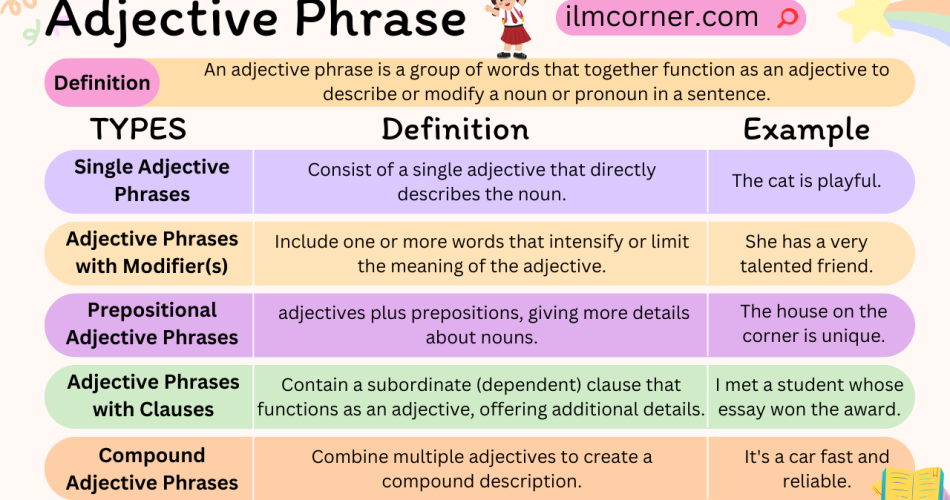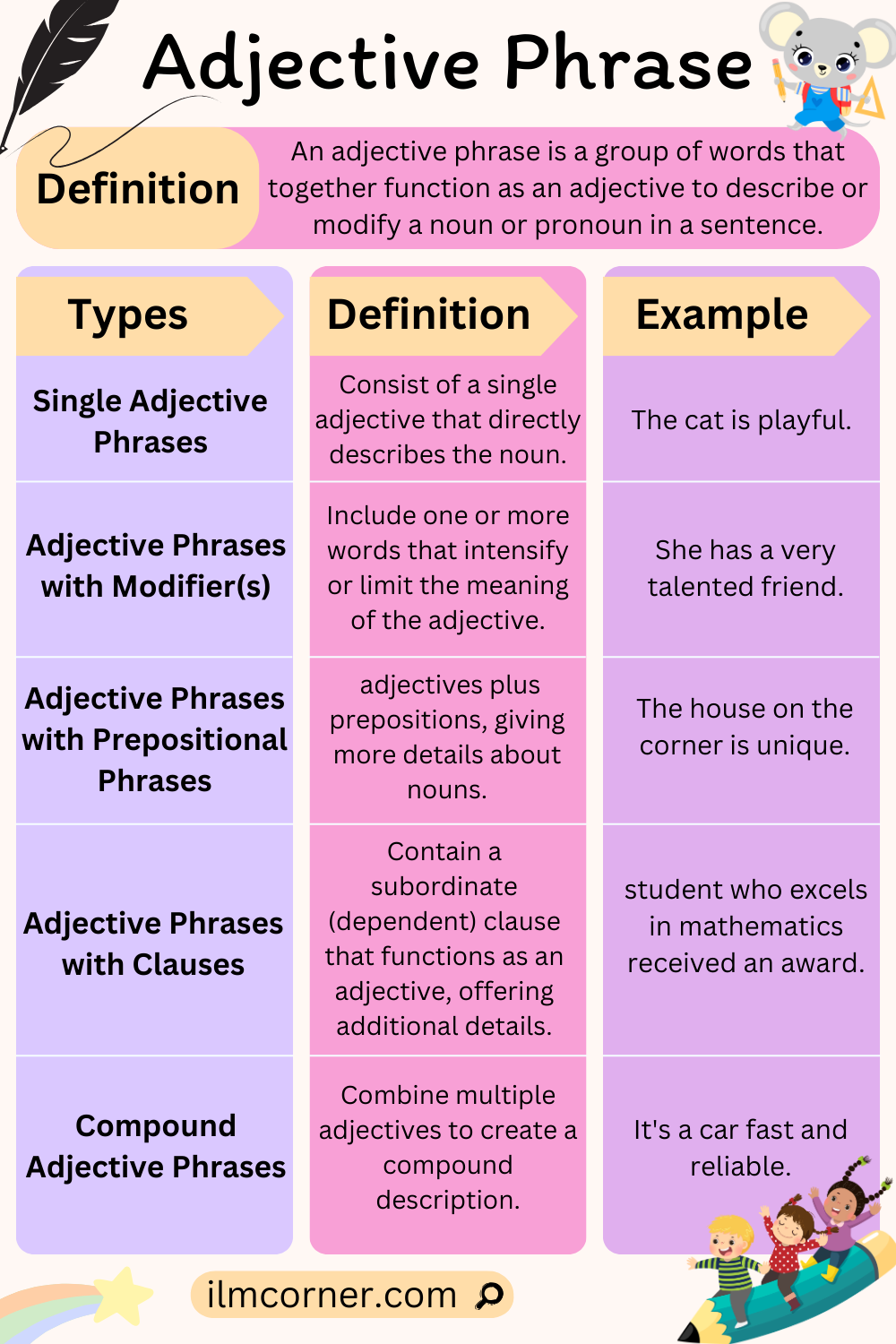An adjective phrase is a group of words that together function as an adjective to describe or modify a noun or pronoun in a sentence. The main purpose of an adjective phrase is to provide more information about the noun, giving details about its qualities, characteristics, or attributes. Instead of saying “I have a dog,” you can use an adjective phrase to say “I have a playful dog with a wagging tail.” Here, “playful” and “with a wagging tail” make up the adjective phrase. It paints a clearer picture of the type of dog you have.
Adjective phrases can vary in length and complexity, but they typically include an adjective along with other words that either intensify or limit the description. These additional words can include adverbs, prepositions, and other elements that contribute to a more nuanced and vivid depiction of the noun.
Here’s a simple breakdown:
- Example:
- Sentence: “The sunburned man with the hat is my uncle.”
- Adjective Phrase: “sunburned,” “with the hat”
- Explanation: “Sunburned” describes the man, and “with the hat” provides additional information about him.
Adjective Phrase Examples:
Here’s a list of adjective phrases:
- The baby had big blue eyes.
- The red apple is delicious.
- A sparkling diamond ring caught her eye.
- The pizza was cheesy and delicious.
- The room was dimly lit and cozy.
- He wore a shirt striped with bold colors.
- The sunflowers in the vase were bright and cheerful.
- The car with the roaring engine sped down the highway.
- The toddler with the curly hair giggled happily.
- The path through the forest was mossy and enchanting.
- The house had a quaint, picket fence.
- The coffee shop was filled with rich, aromatic scents.
- The sky at sunset was painted in warm hues.
- The book on the shelf had a mysterious cover.
- The beach was covered in soft, white sand.
- The umbrella was decorated with colorful patterns.
- The teacher gave us an unexpected pop quiz.
- The piano played a melodious, haunting tune.
- The raincoat was waterproof and brightly colored.
- The mountain peak was snow-capped and majestic.
Components of Adjective Phrases
Adjective phrases are made up of several components that work together to describe or modify a noun or pronoun. The main components include:
- Adjective:
- This is the describing word. It tells you more about a noun, like how it looks, feels, or acts.
- Modifier(s):
- These are extra words that make the describing word more interesting. They can make it stronger or more specific.
- Prepositional Phrases (optional):
- Sometimes, there are extra words that show where something is or how it’s connected to something else. These are prepositional phrases.
Example in Easy Words: Imagine a sentence about a book: “The big book on the top shelf is my favorite.”
- Adjective: “big” (describing the book)
- Modifier: “on the top” (making it more specific)
- Prepositional Phrase: “on the top shelf” (telling you where the book is)
So, when you put them all together, “on the top shelf” adds more detail to the describing word “big,” and they form the adjective phrase that makes the sentence more interesting!
How to Identify Adjective Phrases?
Identifying adjective phrases is a bit like discovering secret codes in sentences. First, you find the main star of the show—the noun. This could be anything from a friendly dog to a cozy blanket. Then, keep your eyes peeled for describing words, the adjectives, that give you more details about your noun. Sometimes, there are extra words like adverbs or prepositions hanging out with the adjectives. If they all work together, you’ve found an adjective phrase! It’s like a little team of words making your sentences more interesting. For instance, in the sentence “The old book with the tattered cover is a treasure,” the adjective phrase is “with the tattered cover,” because it paints a picture of what the old book looks like. So, put on your word detective hat and start uncovering these cool word teams!
Types of Adjective Phrase:
Adjective phrases come in different types based on their structures and functions within sentences. Here are some common types of adjective phrases:
- Single Adjective Phrases:
- Consist of a single adjective that directly describes the noun.
- Example: The cat is playful.
- Adjective Phrases with Modifier(s):
- Include one or more words that intensify or limit the meaning of the adjective.
- Example: She has a very talented friend.
- Adjective Phrases with Prepositional Phrases:
- Involve a prepositional phrase that acts as an adjective, providing information about the noun’s location or relationship.
- Example: The house on the corner is unique.
- Adjective Phrases with Clauses:
- Contain a subordinate (dependent) clause that functions as an adjective, offering additional details.
- Example: The student who excels in mathematics received an award.
- Compound Adjective Phrases:
- Combine multiple adjectives to create a compound description.
- Example: It’s a car fast and reliable.
- Absolute Adjective Phrases:
- Present additional information in a complete phrase, often modifying the entire sentence.
- Example: Weather permitting, we’ll have a picnic.
Difference Between Adjective Phrases and Adjective Clauses
| Aspect | Adjective Phrases | Adjective Clauses (Relative Clauses) |
|---|---|---|
| Form | Groups of words, including an adjective and modifiers. | Groups of words containing a subject and a verb. |
| Example | The book on the shelf is mine. | The woman who is wearing a red dress is my sister. |
| Function | Modify or describe nouns or pronouns. | Modify or describe nouns or pronouns with more detail. |
| Subject and Verb | Do not contain a subject and a verb. | Contain a subject and a verb, functioning as a clause. |
| Stand-alone Sentence | Cannot function as a complete sentence. | Can function as a complete sentence on their own. |
| Complexity | Generally simpler in structure. | Can offer more complexity due to the inclusion of a verb. |
| Common Introducers | Prepositions, adverbs, and adjectives. | Relative pronouns (who, which, that) and relative adverbs. |

